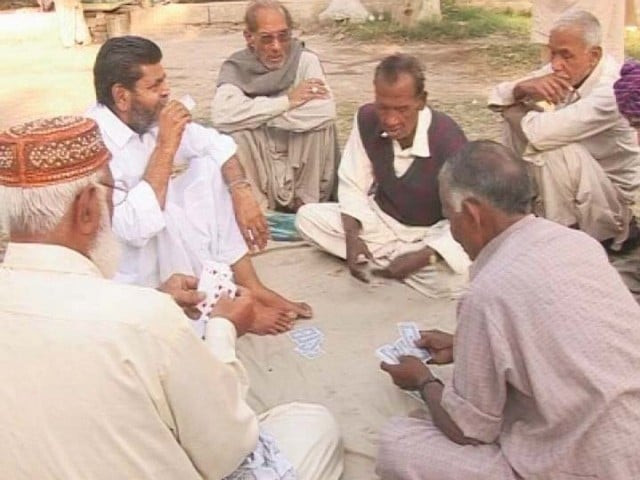Lahore/Karachi:
After spending almost all of their lives on fulfilling obligations, citizens who cross their sixties are left behind aging in the shadows, where both their families and the state treat them as a little more than a burden.
In Pakistan, the older population, which stood at 16.5 million in 2023, is expected to reach 36.6 million by 2050, making one of every fifth Pakistani elderly. Despite the country’s expanding older population, Pakistan still offers limited prospects of a dignified, independent and healthy life for its elderly, the majority of which are left without important services or social security.
Such an elderly citizen was 80-year-old Muhammad Sharif, a retired government employee who lives in Lahore’s Garhi Shahu area. When he was financially stable, he is now struggling to survive. “I invested all my retirement funds in my sons’ businesses. I have three sons and two daughters, all married. My wife is dead, and now I am completely dependent on my children who consider me a burden,” shared sorrowful sharif.
Sharif has tried to access the old age several times, but was denied because of his age and illness. He suffers from diabetes, high blood pressure and extreme physical weakness, he is dependent on support to move. “I have now accepted that I will spend the rest of my days on this charpai (bed),” lamented Sharif, whose story reflects the daily matches of countless elderly people everywhere in Pakistan.
Down south in Karachi, Aslam Shah, a 70-year-old resident in Kharadar, revealed that he suffered from several health problems and had to stand for hours in a long queue at Jinnah Hospital for a simple control. “I have to wait two or three hours before I see a doctor, two hours more to get bloodwork done and another two to three hours to get the reports reviewed by the doctor. There is no seating or water arrangement for the elderly in public hospitals,” complained Shah.
Professor Asghar Zaidi, a public policy expert at the University of Management and Technology (UMT) Lahore, also affiliated with Oxford University’s Institute of Population Aging, emphasized the need for immediate and effective political reforms in accordance with the WHO’s concept of “healthy aging.”
“Geriatric health care should be made a national priority by educating doctors in elderly care and establishing dedicated geriatric units in all major hospitals. There is also a need to expand health insurance for seniors and launch a universal social pension scheme to ensure a basic income for all senior citizens,” implored ZAIDI that emphasized the importance of the importance of the importance of the importance of socially Engagement, the launch of underlying attention to age, and emphasizes and developed the importance of the level of society levels that are launched, and launching attention a nationwide system for the elderly in the home and caregiver training.
On the other hand, Fatima Tahir, a clinical psychologist, asked that elderly citizens, in addition to physical disorders, faced psychological distress because of loneliness and neglect. “This is the life stage where comfort, dignity and social support are crucial, but unfortunately these are missing from our society,” Tahir said.
In Punjab, despite the approval of the Senior Citizen Act 2023 of the Cabinet Committee, the bill remains firm in the legislative pipeline, similarly, in Sindh, in 2016, Sindh Senior Citizens Act was adopted and proposed free treatment at government hospitals and a discount of 25 percent in private hospitals. For a province with an older population of more than 55.7 million, senior citizens await welfare facilities until date.
Dr. Murtaza Khuhro, a local lawyer and public welfare activist, confirmed that the law that related to the elderly needed advertising, and therefore most people did not realize it. “About 5 percent of the population of the province is 60 years or older, and their welfare is the government’s responsibility. An advertising campaign must be launched through television and newspapers to raise awareness among the people it should last for at least two years,” Dr. Khuhro.
Farida Yameen, head of Sindh Senior Citizens Council, revealed that the process of registration of people over the age of 60 was still underway and no older citizen card had been issued to anyone so far. According to the provincial Minister of Social Welfare Mir Tariq Talpur, 25,000 to 30,000 cards have been prepared and will be distributed soon.
Meanwhile, officials of Punjab Social Welfare and Baitul Mal Department have claimed that an old age housing has been set up in six cities, including Lahore, with capacity to accommodate 50 older per year. Center. The facilities also offer free access to public transport and recreation for people over the age of 60. However, realities on Earth tell another story.
Shehzad Khaskheli, director of Foundation for Aging and Inclusive Development (FAID), tagged that although Love was in place across the provinces, the implementation remained minimal.



